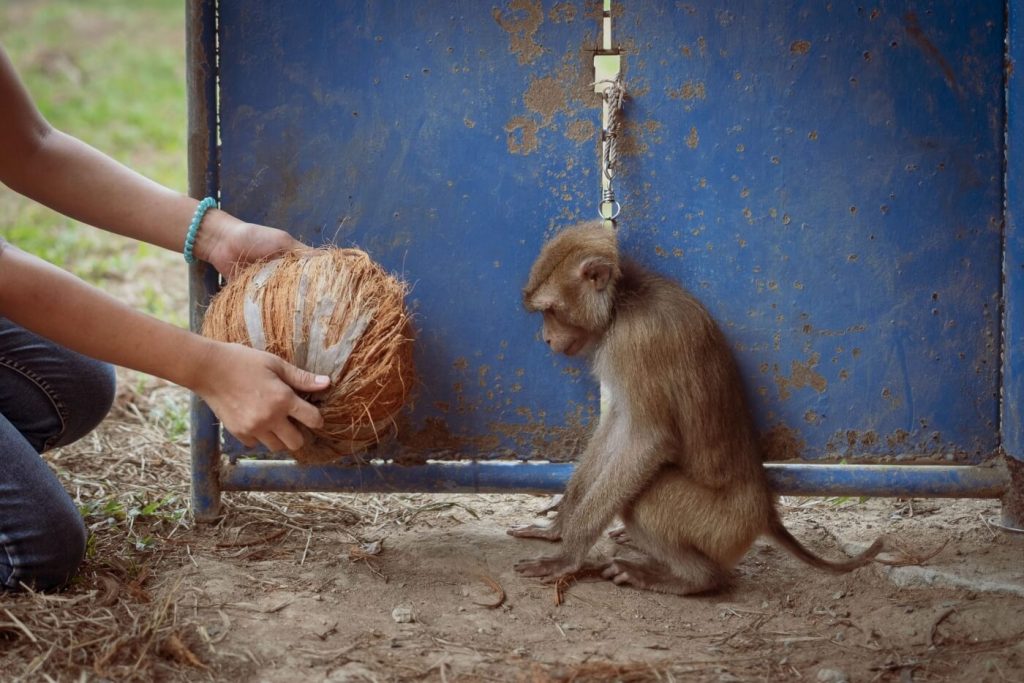In a new shareholder resolution submitted to Amazon, PETA is challenging company subsidiary Whole Foods’ claims that it leads the industry in “responsible sourcing,” because it continues to sell Thai coconut milk—including through its own 365 by Whole Foods Market brand—despite receiving ample evidence of cruelty revealed in PETA Asia’s investigations, which show that in Thailand, monkeys are often captured, forced to pick coconuts, trained through fear of punishment, caged in isolation, and chained for life.
Monkeys in Thailand’s coconut industry. Credit: Raffaele Petralla
“Whole Foods claims to source its products responsibly, yet it helps prop up the rampant abuse and suffering of monkeys in the Thai coconut industry,” says PETA Executive Vice President Tracy Reiman. “PETA is calling on Whole Foods to stop funneling money into this cruel industry and remove Thai coconut milk from its shelves.”
In Thailand’s coconut-picking industry, endangered pig-tailed macaques are often illegally snatched from their forest homes as babies. Handlers put metal collars and leashes on them and may even remove their canine teeth so they can’t defend themselves. PETA Asia’s investigative footage shows trainers striking them, dangling them by their necks, and whipping them. Because workers in the industry lie and the Thai government ignores the systemic reliance on forced monkey labor, it’s impossible to guarantee that any coconut milk from Thailand is free of it. Coconut milk is widely available from countries that don’t use monkey labor—including the Philippines and Sri Lanka—yet Whole Foods continues to sell coconut milk from Thailand.
The full text of PETA’s resolution is below.
PETA—whose motto reads, in part, that “animals are not ours to abuse in any way”—opposes speciesism, a human-supremacist worldview. For more information, please visit PETA.org, listen to The PETA Podcast, or follow the group on X (formerly Twitter), Facebook, or Instagram.
WHEREAS:
Whole Foods claims to lead the industry in responsible sourcing, proudly stating on its website, “[W]e take pride in what we do sell and even more in what we don’t. … Before they go in your cart, they go through us.”
Despite such assertions, Whole Foods is selling products linked to unethical practices, including the use of cruel, exploitative monkey labor in Thailand’s coconut milk industry.
Between 2019 and 2022, PETA Asia conducted three extensive investigations that included 143 locations across 14 provinces in Thailand. After PETA Asia’s first investigation, the Thai government and coconut milk producers claimed that monkeys were no longer being used in the making of exported products; however, investigators have confirmed that the abuse of monkeys for coconuts remains rampant.
In the Thai coconut milk industry, endangered pig-tailed macaques are illegally snatched from the wild and forced into “monkey schools,” where handlers use intimidation and abuse to force them to obey. When their training is complete, the monkeys are sold to coconut pickers. Tethered by the neck with a metal collar, the monkeys are forced to climb up and down trees and pick heavy coconuts all day. They’re chained for extended periods, condemned to a lifetime of misery on barren or trash-strewn patches of dirt with almost no protection from the elements.
Although Whole Foods has denied sourcing coconut milk that uses monkey labor for its own brand, PETA exposés demonstrate that it is nearly impossible to guarantee that any coconut milk from Thailand is exempt from this abuse. Due to the extensive media coverage and intense international pressure to stop this inhumane practice, Thai coconut industry insiders have turned to hiding monkey labor. One broker even admitted to investigators that with no oversight, coconut pickers simply lie. And Whole Foods continues to sell coconut milk from other brands implicated in the investigations.
Given the extensive use of forced monkey labor in Thailand, the wide availability of coconut milk sourced from countries that do not use monkey labor, and the Thai coconut industry’s dishonesty and refusal to transition to monkey-free harvest methods, it is reasonable for shareholders to demand that our company reevaluate its coconut milk supply chains.
BE IT RESOLVED:
Shareholders request that Amazon.com Inc. issue a report prior to December 31, 2024, assessing the feasibility of halting Whole Foods’ sourcing of any coconut milk from Thailand, whether through its own 365 label or other brands. The report should consider the potential risks to Whole Foods’ reputation, sales, and share value by continuing to sell coconut milk sourced from Thailand. The report should omit confidential and privileged information and be prepared at a reasonable expense.
The post Whole Foods’ Ties to Monkey Abuse Called Out in PETA Shareholder Resolution appeared first on PETA.

